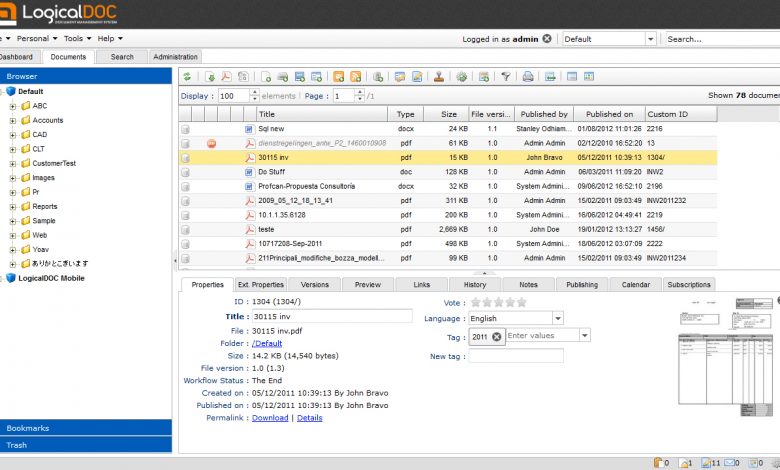Use the free document management tool LogicalDOC to get going.

Every year, it seems like there is a frantic rush to figure out how to be more productive. This is due mainly to the “out with the old, in with the new” mentality, new year’s resolutions, and the want to start the year off correctly. Additionally, the regular round of suggestions overwhelmingly favours commercial and closed-source applications. It’s not necessary to be that way. This blog post will cover everything you need to know about logicaldoc.com construction industry document management software.
What exactly is LogicalDOC, and how does it function?
LogicalDoc is a Document Management Application that assists enterprises in successfully organising and storing all vital documents in one location. Its clever tagging function significantly reduces data retrieval time. The use of online forms and electronic signature systems aids in the reduction of paper consumption. Users can choose a record retention timeline based on compliance requirements to decrease the risk of non-compliance with statutory records. The software enables customers to remotely access all pertinent records via cellphones, mobiles, or tablets. LogicalDoc also allows several users to collaborate on a single document as needed. LogicalDoc works well on all operating systems, including Windows, Linux, and macOS. It also enables cloud storage, allowing businesses to save and access all documents. Its workflow engine is programmable, allowing organisations to specify durations for each action. LogicalDoc’s built-in versatile software platform is intended to meet the most complicated business requirements.
LogicalDOC
Finding what you need when you need it is necessary to be productive. As a result of renaming files each time a document changes to maintain track of all the revisions, we’ve all seen folders full of files with identical names and similar content. As an illustration, my wife writes frequently and saves document updates with new names before sending them to reviewers.
Git or another version control tool, which is a programmer’s apparent response to this issue, won’t work for authors of documents since commercial text editors frequently don’t support the formats used by systems used for coding. Before someone suggests “simply change formats,” remember that not everyone has that choice. Additionally, many version control technologies are not very user-friendly for non-technical people. There are methods to handle this issue in huge businesses, but they also need the resources of a large company to operate, administer, and maintain them.
It has created An open-source document management system called LogicalDOC CE to address this issue. Like the version control systems used by programmers, it enables users to check in, check out, version, search, and lock document files and maintains a history of versions.
LogicalDOC may be set up on Linux, macOS, and Windows using a Java-based installer. You’ll be asked during installation for information on the database that will house its data and given the choice of a local-only file store. You will receive the server’s URL, default login and password, and the ability to store a script to automate other instals.
The first screen you see when logging in to LogicalDOC displays a list of the papers you have checked out, annotated, and tagged. The files you access will be shown when you select the Documents tab. You may upload documents using drag and drop or by choosing a file from the interface. A ZIP file you submit will be expanded by LogicalDOC and add its files to the repository.
A menu of choices to check out files, lock files against modifications, and perform various additional tasks will appear when you right-click on a file. When a file is checked out, it is downloaded to your local computer, which may change it. No one else can change a file until it is checked back in. The user can add tags to the version and is required to remark on what was changed when the file is checked back in (using the same option).
Downloading prior versions from the Versions page makes it simple to look back and review them. Some third-party services with built-in Dropbox integration include import and export capabilities. Document management is not just for big companies that can afford expensive solutions. LogicalDOC helps you keep track of the documents you’re using with revision history and a safe repository for otherwise difficult-to-manage documents.




